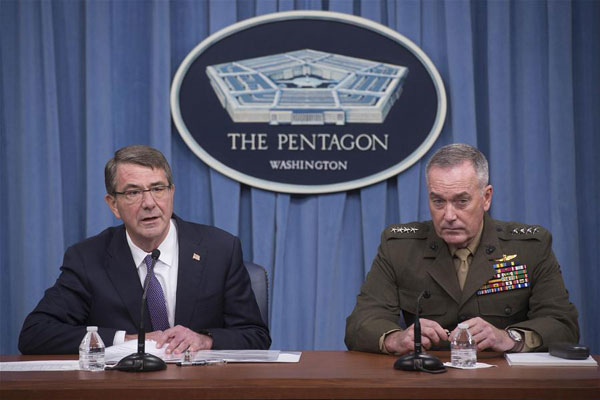 |
|
US Secretary of Defense Ash Carter (L), together with Chairman of the Joint Chiefs of Staff Gen. Joseph Dunford, speaks to press during a briefing at the Pentagon in Washington D.C., the United States, on March 25, 2016.[Photo/Xinhua] |
We have no idea what the wording is like in the classified version. But the text of the Pentagon's unclassified 2016 report on China's military and security developments has already provoked "strong dissatisfaction and firm opposition" from Beijing.
Washington may believe that Beijing is overreacting, since the Pentagon's latest annual report to the US Congress is by and large business as usual.
But Beijing, too, sees Washington as overreacting: Not only does this year's report devote considerably more space to the South China Sea issue, but it portrays Chinese moves there as "coercive", misrepresenting Chinese actions and intentions.
This may not seem like a big deal, given the lingering tension in the South China Sea, and given the fact that mutual finger-pointing has become the new normal for the Pentagon and its Chinese counterpart; particularly since they are conscious of and serious about negotiating the potential risks of escalating tensions.
On Thursday, one day prior to the report's release, the chairmen of the two countries' Joint Chiefs of Staff spoke to each other via a video teleconference and committed to communicating more frequently to "address key issues".
Such contact, along with the formulation of a shared code of conduct for the two militaries' unexpected encounters, assure us that, risky as they look, the tense encounters between the two countries' naval and air forces are being managed professionally so as to not lead to unwanted outcomes.
That explains our belief that the biggest danger does not lie in those physical standoffs. Instead, it lurks in the quiet accumulation of negative mutual perceptions, and the subsequent potential for misjudgment.
That is why we should not underestimate the contradictory ways Beijing and Washington describe what is happening in the South China Sea.
Certainly there is no easy way to undo the confusions surrounding the South China Sea, at least before a certain degree of consensus is maneuvered on the causation at work.
But the picture would appear clearer if Beijing made its case more solid from the perspectives of both history and international law, and Washington stopped refusing the basic truth that Beijing is not making new, aggressive territorial claims, nor is it acting forcefully unprovoked.
It would help, too, if the US could appreciate Beijing's dilemma: It cannot afford inaction in the face of provocations; nor does it want any dispute to ruin what it cherishes for regional peace and development.
More importantly, the US should not categorically ignore that Beijing persistently appeals for negotiations to resolve the disputes.

I’ve lived in China for quite a considerable time including my graduate school years, travelled and worked in a few cities and still choose my destination taking into consideration the density of smog or PM2.5 particulate matter in the region.